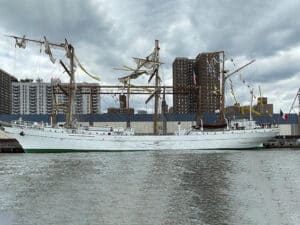
IMO’s Sekimizu calls for shipowner action on key issues
Written by Nick Blenkey SEPTEMBER 14, 2012 — IMO Secretary-General Koji Sekimizu this week used a keynote address to the International Chamber of Shipping (ICS) Conference in London to call on governments and the shipping industry to take prompt and decisive action on a number of key issues.
SEPTEMBER 14, 2012 — IMO Secretary-General Koji Sekimizu this week used a keynote address to the International Chamber of Shipping (ICS) Conference in London to call on governments and the shipping industry to take prompt and decisive action on a number of key issues.
Mr. Sekimizu told shipowners that they had the power to encourage their flag states to ratify the International Convention for the Control and Management of Ships’ Ballast Water and Sediments, 2004 (Ballast Water Management Convention) as soon as possible, as well as to implement its provisions with immediate effect.
He pointed to the good number of ballast water treatment technologies now approved and available, together with the fixed deadlines for their application contained in the Convention, as convincing reasons why the industry should not wait any longer to implement its provisions.
“The Convention was adopted unanimously in 2004 and, since then, all the fourteen sets of required guidelines for its implementation have been adopted,” said the Secretary General. “To date, 28 ballast water management systems have been granted Type Approval by their respective Administrations, and dozens of other systems are in various stages of development. The tools for effective implementation of the BWM Convention are, therefore, in place.
“If you have ships that fall under the provisions of the Convention, you need to install ballast water management systems in accordance with the timeline stipulated in the Convention. And, today, there is ample choice of systems and the implementation dates of the D-2 standard are known.
“This is particularly true for newbuilds. They will need a ballast water treatment system, sooner or later. It is surely better to start now, as retrofitting will be more expensive.
“Concerns have been raised about whether there is sufficient shipyard capacity for installing systems on thousands of ships. Timely action from you, the shipowners, will alleviate this concern; postponing action will simply increase it.
“The possibility of unilateral action from certain countries is also emerging as a source of concern for many. Entry into force of the BWM Convention would, to a large extent, reduce this concern, as there would be one set of international regulations in place, i.e. those of the Convention.
“It must be recognized that the BWM Convention was adopted before we had sufficient practical experience of managing ballast water aboard ships, in particular in terms of using treatment systems. Entry into force of the Convention would provide the chance to improve it, by amending it as may be necessary.
“Shipowners can take leadership in this important issue by encouraging flag Administrations to ratify the Convention, which will remove many of the associated uncertainties.
“By doing so, you will also take an important step towards reducing, and ultimately eliminating the risks to the environment, human health, property and resources arising from the transfer of harmful aquatic organisms and pathogens through ships’ ballast water and sediments and provide a firm expression of responsible stewardship towards protecting the marine environment.”
Warning of the negative consequences of further delay in bringing the convention into force, Mr. Sekimizu said; “The problems associated with ballast water are inherently connected to the expansion of world trade. This is an issue from which the shipping industry cannot escape.”
Turning to the matter of the Costa Concordia accident earlier this year, in which 32 people lost their lives, Mr. Sekimizu said the incident had focussed the attention of the general public on the safety of large passenger ships, and that the stakes were high for the impending discussion on the matter at the November meeting of IMO’s Maritime Safety Committee.
“I cannot overstress how important it is,” he said, “that we receive the findings from the investigation as soon as possible, so that IMO can learn the lessons and take decisive steps to improve the safety of large cruise ships.”
Referring to operational measures already being implemented by the cruise industry in this regard, he added, “Our regulatory system should also be strengthened to formalize the actions it takes and support its efforts.”
The Costa Concordia foundered off the coast of Italy in January this year. Mr. Sekimizu called on IMO Member States to consider effective measures to reduce the risk of groundings, to avoid any recurrence in the future.
In a wide-ranging speech, the Secretary-General also called for the shipping industry to show leadership by implementing straight away the energy efficiency measures already adopted by IMO, without waiting for their formal entry into force. He added that he hoped the IMO’s Marine Environment Protection Committee would make progress on the matter of market-based measures for further greenhouse gas reduction at its next meeting, in October this year.
Mr. Sekimizu also took the opportunity to assure the industry of IMO’s continuing commitment to work towards the resolution of the piracy crisis, and to outline his own vision for sustainable maritime development in the light of the Rio+20 Conference on sustainable development held in June this year.
You can read the full address HERE





Leave a Reply
You must be logged in to post a comment.